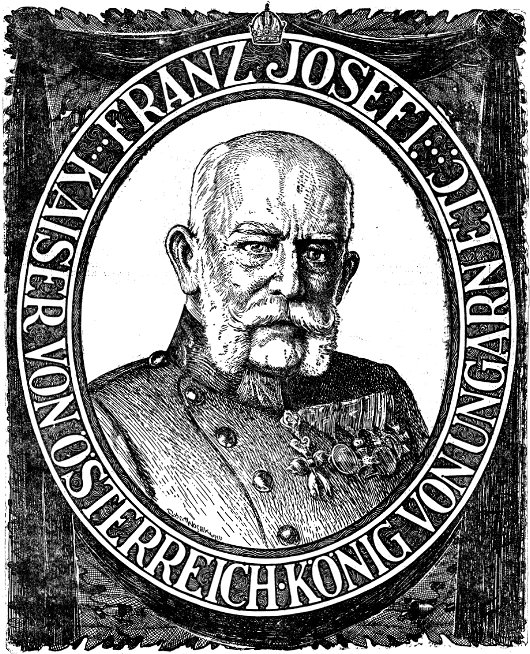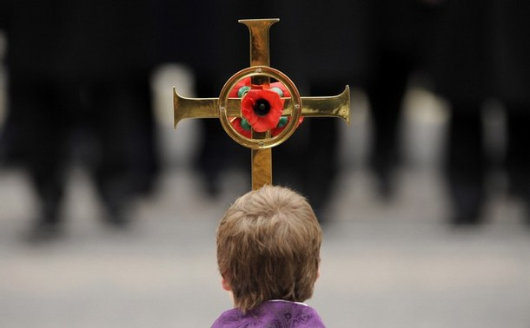Monarchy
About Andrew Cusack
 Writer, web designer, etc.; born in New York; educated in Argentina, Scotland, and South Africa; now based in London.
Writer, web designer, etc.; born in New York; educated in Argentina, Scotland, and South Africa; now based in London. read more
News
Blogs
Reviews & Periodicals
Arts & Design
World
France
Mitteleuropa
Knickerbockers
Argentina
The Levant
Africa
Cape of Good Hope
Netherlands
Scandinavia
Québec
India
Muscovy
Germany
Academica
The Principality of South Africa
“… or some such thing.”
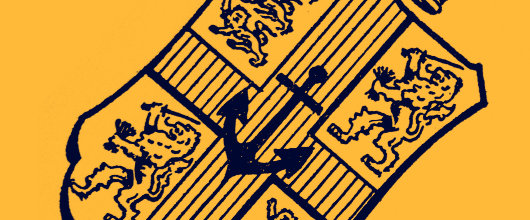
History has shown that good ideas often come from the humblest of sources. One such example, though regrettably one of a suggestion not put into practice, was a proposal submitted by D. M. Perceval, the humble clerk of the Advisory Council of the Cape of Good Hope colony in 1827 to his higher-ups in the Colonial Office in London. Perceval wrote to request an official seal for the British colony at the end of Africa, but he went a step further with his fairly normal request, extraordinarily suggesting that “the opportunity might be taken to erect [the Cape of Good Hope] into the Principality of South Africa, or some such thing, for the present name is really too absurd for the whole country.”
The title “Prince of South Africa” would have been part of the British Crown, and presumably available as a courtesy title for offspring, just as the eldest son is often (such as now) created Prince of Wales. Would the second son then be “Prince of South Africa”, or would the title stay with the Sovereign? “By the grace of God, King of Great Britain & Ireland, Emperor of India, Prince of South Africa, &c.” It does have a nice ring to it. (more…)
Of tribes and traditions
In tribal Africa, Ghaddafi expounds traditional government; Meanwhile ethnic Romanians vote to be ruled by their German neighbours.

«Ghaddafi dreams of kings, princes, sultans, sheiks»
reports the Afrikaans newspaper Die Burger.
ONE OF THE LESS-REPORTED aspects of the selection of Col. Moammar al-Ghaddafi, the tent-dwelling Libyan leader and notorious eccentric, as Chairman of the African Union was his proposal that an upper house of “kings, princes, sultans, sheiks, and other traditional leaders” be added to the Pan-African Parliament. Col. Ghaddafi has been forthright in his condemnation of democracy as ill-suited to the African continent. “We don’t have any political structures [in Africa], our structures are social,” he explained to the press. Africa is essentially tribal, the argument goes, and as such multi-party democracy always develops along tribal lines, which eventually leads to tribal conflict and warfare. “That is what has led to bloodshed,” the AU chairman posited, citing the recent example of the Kenyan elections.
Europe, of course, solved the matter of tribal difficulties by brutally uprooting long-established peoples from their native lands after the Second World War and transferring them to jurisdictions in which they would ostensibly be part, not only of the majority, but of theoretically “national” states. Cities with centuries of Polish history became Soviet, towns as German as sauerkraut became Polish, and so on and so forth. Sometimes the undesired populations of multi-ethnic places were cruelly murdered, as recent revelations from the police in Bohemia have shown.
Still, remnants of the old cosmopolitan order remain. (more…)
A Good Day in Cape Town
The South African Royal Family’s 1947 visit to “Die Moederstad”
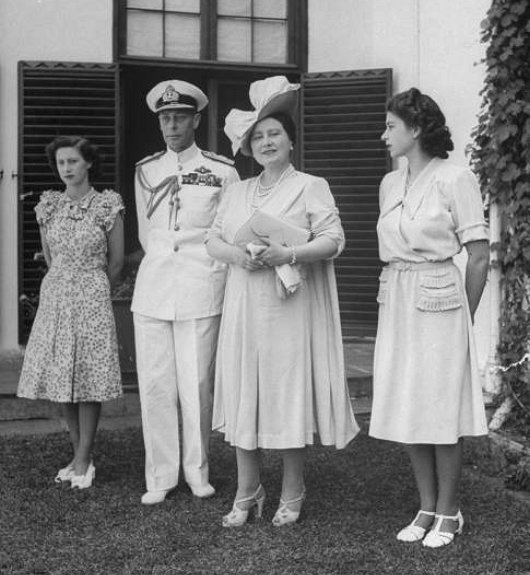
SOUTH AFRICA IS a nation that took a long time birthing, from the first steps van Riebeeck took on the sands of Table Bay in 1652, through the tumult of the native wars, the tremendous conflict between Briton & Boer, and ultimately what was hoped would be the final reconciliation in Union of South Africa — 1910. In that year, young Prince Albert of York & of Saxe-Coburg-Gotha was just fifteen years of age, and South Africa became a dominion just weeks after his father became King George V.
Albert was the second son of a second son, so at the time of his birth (and for most of his early life) it was never expected that he would one day be King of Great Britain, Emperor of India. It was his brother’s abdication that thrust poor Bertie, as he was always known to his loved ones, upon the throne imperial. It was a cold December day in 1936 that the heralds of the Court of St. James proclaimed him George VI.
By his nature, the King was a quiet and reserved man, partly because of the stammer that impeded his speech. George VI was happiest among his family, and they accompanied him in 1947 on a long voyage aboard HMS Vanguard, to his far-off kingdom on the other side of the world, where the two oceans meet. It was the first time a reigning monarch has set foot on South African soil, and Capetonians waited in earnest anticipation to see their sovereign. How appropriate that this happy city — moederstad, or “mother-city”, of all South Africa — would be the first to receive him. (more…)
The Young Emperor
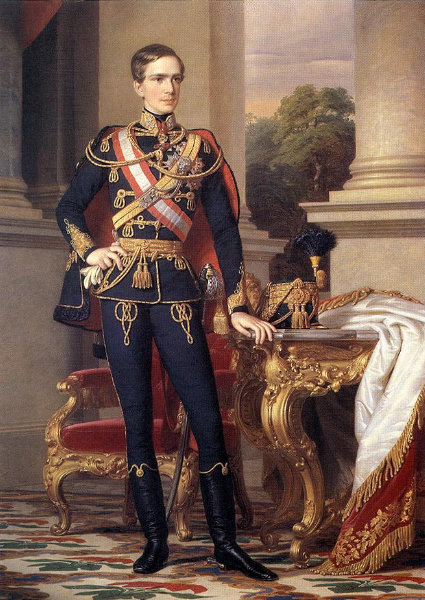
A reader notes in correspondence that Franz Joseph was not always old — though the popular conception certainly is of the Emperor in his later years. Here is the young Franz Joseph (or Ferenc József), just five years after he became Emperor of Austria, King of Hungary, Bohemia, &c. The Emperor became so at such a young age because his father, Ferdinand I, abdicated after the revolts of 1848.
This portrait is by the Hungarian painter Miklós Barabás, who also completed portraits of the composer Franz Liszt, the novelist Baron József Eötvös de Vásárosnamény, William Tierney Clark, the Bristol engineer responsible for Budapest’s famous Chain Bridge, and many, many others.
The Queen at the Armory
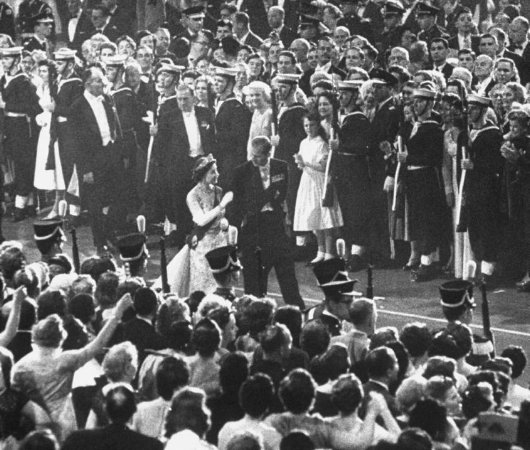
Queen Elizabeth II & the Duke of Edinburgh attend a ball in their honour at the Seventh Regiment Armory in New York; October, 1957.
Praying with the Kaisers
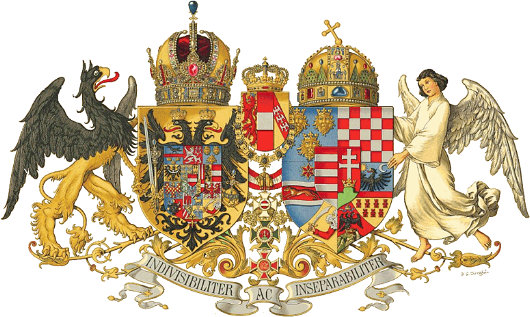
by JOHN ZMIRAK
INSIDECATHOLIC.COM
As I’m writing this column at the tail end of my first trip to Vienna, some of you who’ve read me before might expect a bittersweet love note to the Habsburgs — a tear-stained column that splutters about Blessed Karl and “good Kaiser Franz Josef,” calls this a “pilgrimage” like my 2008 trip to the Vatican, and celebrates the dynasty that for centuries, with almost perfect consistency, upheld the material interests and political teachings of the Church, until by 1914 it was the only important government in the world on which the embattled Pope Pius X could rely for solid support. Then I’d rant for a while about how the Empire was purposely targeted by the messianic maniac Woodrow Wilson, whose Social Gospel was the prototype for the poison that drips today from the White House onto the dome of Notre Dame.
And you would be right. That’s exactly what I plan to say — so dyed-in-the-wool Americanists who regard the whole of the Catholic political past as a dark prelude to the blazing sun that was John Courtenay Murray (or John F. Kennedy) might as well close their eyes for the next 1,500 words — as they have to the past 1,500 years.
But as I bang that kettle drum again, I want to set two scenes, one from a fine and underrated movie, the other from my visit. The powerful historical drama “Sunshine” (1999) stars Ralph Fiennes as three successive members of a prosperous Jewish family in Habsburg Budapest. The film was so ambitious as to try portraying the broad sweep of historical change — and, as a result, it was not especially popular. What historical dramas we moderns tend to like are confined to the tale of a single hero, and how he wreaks vengeance on the villains with English accents who outraged the woman he loved. “Sunshine”, on the other hand, tells the vivid story of the degeneration of European civilization in the course of a mere 40 years. The Sonnenschein family are the witnesses, and the victims, as the creaky multinational monarchy ruled by the tolerant, devoutly Catholic Habsburgs gives way through reckless war to a series of political fanaticisms — all of them driven by some version of Collectivism, which the great Austrian Catholic political philosopher Erik von Kuenhelt-Leddihn calls “the ideology of the Herd.”
From a dynasty that claimed its legitimacy as the representative of divine authority at the apex of a great, interconnected pyramid of Being in which the lowliest Croatian fisherman (like my grandpa) had liberties guaranteed by the same Christian God who legitimated the Kaiser’s throne, Central Europe fell prey to one strain after another of groupthink under arms: From the Red Terror imposed by Hungarian Bolsheviks who loved only members of a given social class, to radical Hungarian nationalists who loved only conformist members of their tribe, to Nazi collaborationists who wouldn’t settle for assimilating Jews but wished to kill them, finally to Stalinist stooges who ended up reviving tribal anti-Semitism. The exhaustion at the film’s end is palpable: In the same amount of time that separates us today from President Lyndon Johnson, the peoples of Central Europe went from the kindly Kaiser Franz Josef through Adolf Hitler to Josef Stalin. Call it Progress.
Apart from a heavily bureaucratic empire that spun its wheels preventing its dozens of ethnic minorities from cleansing each other’s villages, what was lost with the fall of the Austro-Hungarian monarchy? For one thing, we lost the last political link Western Christendom had with the heritage of the Holy Roman Empire. (Its crown stands today in the Imperial Treasury at the Hofburg, and for me it’s a civic relic.) Charlemagne’s co-creation with the pope of his day, that Empire had symbolized a number of principles we could do well remembering today: Principally, the Empire (and the other Christian monarchies that once acknowledged its authority) represented the lay counterpart to the papacy, a tangible sign that the State’s authority came not from mere popular opinion, or the whims of tyrants, but an unchangeable order of Being, rooted in divine revelation and natural law.
The job of protecting the liberty of the Church and enforcing (yes, enforcing) that Law fell not to the clergy but to laymen. The clergy were not a political party or a pressure group — but a separate Estate that often as not served as a counterbalance to the authority of the monarchy. No monarch was absolute under this system, but held his rights in tension with the traditional privileges of nobles, clergy, the citizens of free towns, and serfs who were guaranteed the security of their land. Until the Reformation destroyed the Church’s power to resist the whims of kings — who suddenly had the option of pulling their nation out of communion with the pope — no king would have had the power or authority to rule with anything like the monarchical power of a U.S. president. Of course, no medieval monarch wielded 25-40 percent of his subjects’ wealth, or had the power to draft their children for foreign wars. It took the rise of democratic legal theory, as Hans Herman Hoppe has pointed out, to convince people that the State was really just an extension of themselves: a nice way to coax folks into allowing the State ever increasing dominance over their lives.
A Christian monarchy, whatever its flaws, was at least constrained in its abuses of power by certain fundamental principles of natural and canon law; when these were violated, as often they were, the abuse was clear to all, and the monarchy often suffered. In extreme cases, kings could be deposed. Today, by contrast, priests in Germany receive their salaries from the State, collected in taxes from citizens who check the “Catholic” box. So much for the independence of the clergy.
The House of Austria ruled the last regime in Europe that bound itself by such traditional strictures, which took for granted that its family and social policies must pass muster in the Vatican. By contrast, in the racially segregated America of 1914, eugenicists led by Margaret Sanger were already gearing up to impose mandatory sterilization in a dozen U.S. states (as they would succeed in doing by 1930), while Prohibitionist clergymen and Klansmen (they worked together on this) were getting ready to close all the bars. As historian Richard Gamble has written, in 1914 the United States was the most “progressive” and secular government in the world — and by 1918, it was one of the most conservative. We didn’t shift; the spectrum did.
Dismantled by angry nationalists who set up tiny and often intolerant regimes that couldn’t defend themselves, nearly every inch of Franz-Josef’s realm would fall first into the hands of Adolf Hitler, then those of Josef Stalin. Today, these realms are largely (not wholly) secularized, exhausted perhaps by the enervating and brutal history they have suffered, interested largely in the calm and meaningless comfort offered by modern capitalism, rendered safer and even duller by the buffer of socialist insurance. The peoples who once thrilled to the agonies and ecstasies carved into the stone churches here in Vienna can now barely rouse the energy to reproduce themselves. Make war? Making love seems barely worth the tussle or the nappies. Over in America, we’re equally in love with peace and comfort — although we’ve a slightly higher (market-driven?) tolerance for risk, and hence a higher birthrate. For the moment.
Speaking of children brings me to the most haunting image I will take away from Austria. I spent a whole afternoon exploring the most beautiful Catholic church I have ever seen — including those in Rome — the Steinhof, built by Jugendstil architect Otto Wagner and designed by Kolomon Moser. An exquisite balance of modern, almost Art-Deco elements with the classical traditions of church architecture, it seems to me clear evidence that we could have built reverent modern places of worship, ones that don’t simply ape the past. And we still can. A little too modern for Kaiser Franz, the place was funded, the kindly tour guide told me in broken English, by the Viennese bourgeoisie. (Since my family only recently clawed its way into that social class, I felt a little surge of pride.) Apart from the stunning sanctuary, the most impressive element in the church is the series of stained-glass windows depicting the seven Spiritual and the seven Corporal Works of Mercy — each with a saint who embodied a given work. All this was especially moving given the function of the Steinhof, which served and serves as the chapel of Vienna’s mental hospital. (It wasn’t so easy getting a tour!) The church was made exquisite, the guide explained, intentionally to remind the patients that their society hadn’t abandoned them. Moser does more than Sig Freud can to reconcile God’s ways to man.
We see in the chapel the spirit of Franz Josef’s Austria, the pre-modern mythos that grants man a sacred place in a universe where he was created a little lower than the angels — and an emperor stands only in a different spot, with heavier burdens facing a harsher judgment than his subjects. No wonder Franz Josef slept on a narrow cot in an apartment that wouldn’t pass muster on New York’s Park Avenue, rose at 4 a.m. to work, and granted an audience to any subject who requested it. He knew that he faced a Judge who isn’t impressed by crowns.
As we left the church, I asked the guide about a plaque I’d seen but couldn’t quite ken, and her face grew suddenly solemn. “That is the next part of the tour.” She explained to me and the group the purpose of the Spiegelgrund Memorial. It stands in the part of the hospital once reserved for what we’d call “exceptional children,” those with mental or physical handicaps. While Austria was a Christian monarchy, such children were taught to busy themselves with crafts and educated as widely as their handicaps permitted. The soul of each, as Franz Josef would freely have admitted, was equal to the emperor’s. But in 1939, Austria didn’t have an emperor anymore. It dwelt under the democratically elected, hugely popular leader of a regime that justly called itself “socialist.” The ethos that prevailed was a weird mix of romanticism and cold utilitarian calculation, one which shouldn’t be too unfamiliar to us. It worried about the suffering of lebensunwertes Leben, or “life unworthy of life”–a phrase we might as well revive in our democratic country that aborts 90 percent of Down’s Syndrome children diagnosed in utero. So the Spiegelgrund was transformed from a rehabilitation center to one that specialized in experimentation. As the Holocaust memorial site Nizkor documents:
In Nazi Austria, parents were encouraged to leave their disabled children in the care of people like [Spiegelgrund director] Dr. Heinrich Gross. If the youngsters had been born with defects, wet their beds, or were deemed unsociable, the neurobiologist killed them and removed their brains for examination. …
Children were killed because they stuttered, had a harelip, had eyes too far apart. They died by injection or were left outdoors to freeze or were simply starved.
Dr. Gross saved the children’s brains for “research” (not on stem cells, we must hope). All this, a few hundred feet from the windows depicting the Works of Mercy. Of course, they’d been replaced by the works of Modernity.
We’re much more civilized about this sort of thing nowadays, as the guests at Dr. George Tiller’s secular canonization can testify. In true American fashion, our genocide is libertarian and voluntarist, enacted for profit and covered by insurance.
I will think of the children of the Spiegelgrund tomorrow, as I spend the morning in the Kapuzinkirche, where the Habsburg emperors are buried — and the Fraternity of St. Peter say a daily Latin Mass. As I pray the canon my ancestors prayed and venerate the emperors they revered, I will beg the good Lord for some respite from all the Progress we’ve enjoyed.
Blessed Karl I, ora pro nobis.
[Dr. John Zmirak‘s column appears every week at InsideCatholic.com.]
Mass for Prince Pedro Luiz
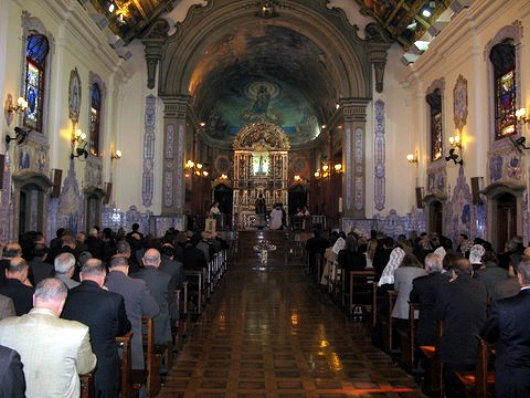
The “week’s mind” Mass, or Mass of seven days, was held a week after the death of Dom Pedro Luiz of Orleans-Braganza in São Paulo, Brazil on June 8, 2009. The Mass was offered according to the extraordinary (or Tridentine) form of the Latin rite. The members of the Imperial Family of Brazil were in attendence. (more…)
On the Death of Prince Pedro Luiz
A STATEMENT FROM D. LUIZ DE ORLEANS E BRAGAÇA
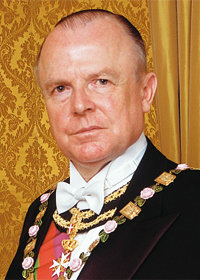 PIERCED WITH SORROW, I fulfill my duty as Head of the Imperial House of Brazil to communicate the disappearance of my beloved nephew and much-regretted D. Pedro Luiz de Orleans e Bragança, in the fateful May 31 ocean crash of the Air France Rio-Paris flight.
PIERCED WITH SORROW, I fulfill my duty as Head of the Imperial House of Brazil to communicate the disappearance of my beloved nephew and much-regretted D. Pedro Luiz de Orleans e Bragança, in the fateful May 31 ocean crash of the Air France Rio-Paris flight.
Given the harrowing pain of his parents, D. Antonio and D. Christine, his brothers, D. Amélia, D. Rafael and D. Maria Gabriela, and my dear Mother, D. Maria, I turn to them with special solicitude and affection. And with the whole Imperial Family, I turn with the same solicitude and affection to all those who have lost their loved ones in the crash. To all these families – so very special to Brazil – the Imperial Family extends its feelings and asks God for the eternal repose of each and every victim.
Over the last few days, D. Pedro Luiz’s parents and I have received so many manifestations of genuine mourning for the tragic event that I can only see these events as a living and authentic expression of the sense of family and ties of affection that unites the Imperial Family and all Brazilians, whether monarchist or not.
D. Pedro Luiz – the fourth in the line of dynastic succession – was a young Prince who rose in his generation as a promise, having attracted the interest and attention of many for his pleasant ways, undeniable qualities and for the traditions he represented.
As a result of his excellent upbringing and fine sense of duty, instilled by his parents, after having graduated in Business Administration at IBMEC in Rio de Janeiro, and his post-graduation at FGV, he took the initial steps of a promising career at BNP Paribas in Luxembourg, and showed great concern and commitment to show foreigners the great potential of our country.
But his presence was especially dear among those who believe the monarchy is the solution for today’s Brazil.
D. Pedro Luiz was honorary president of Monarchist Youth and participated in noteworthy activities and events to the benefit of the monarchic ideal, often in the company of his parents. He represented the Imperial House on occasion, and I am especially pleased to recall his presence in Portugal for the celebration of the 500th anniversary of the discovery of Brazil.
While this is a moment of apprehension and sadness, it can not be devoid of hope. Our hopes turn particularly to D. Pedro Luiz’s brother, D. Rafael – to whom I wish courage and determination in the face of misfortune, and whom I urge to be a true example of a Prince to his generation, turned to the good of Brazil and to setting an example of Christian virtues.
To close this painful communiqué, I turn my eyes to Our Lady Aparecida, Queen and Patroness of Brazil, Whom we beseech with confidence to receive D. Pedro Luiz in eternity. And I ask for special prayers for him, as well as for his parents, brothers and my dear mother, from all those who, in a spirit of faith, have supported the Imperial Family at this time of mourning.
São Paulo , June 5, 2009
Dom Luiz de Orleans e Bragança
Head of the Imperial House of Brazil

RIP: Dom Pedro Luís of Brazil

Dom PEDRO LUÍS MARIA JOSÉ MIGUEL
RAFAEL GABRIEL GONZAGA
de
ORLÉANS-BRAGANÇA
e
LIGNE
Prince of the Imperial House of Brazil
Son of H.I.H. Prince Antônio of Orléans-Braganza
&
H.H. Princess Christine of Ligne
Born 12 January 1983 in Rio de Janeiro.
Died 1 June 2009, on Air France Flight 447.
Until his early death, heir-presumptive to the Imperial throne of Brazil.
Requiem aeternam dona ei, Domine:
et lux perpetua luceat ei.
Requiescat in pace.
Amen.
Some Words from Doorn on the Present Crisis
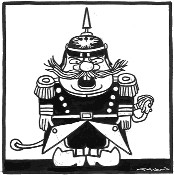 Loyal commenter Steve M. sends word that Kaiser Wilhelm II (currently of Doorn, the Netherlands) has written an open letter to His Excellency President Barack Obama of the United States.
Loyal commenter Steve M. sends word that Kaiser Wilhelm II (currently of Doorn, the Netherlands) has written an open letter to His Excellency President Barack Obama of the United States.
His Imperial Majesty objects to the current practice of appointing “czars” to deal with the various crises at hand, and offers a few alternative suggestions of his own.
Our readers will, no doubt, recall the Kaiser from his previous appearances on his blog here, here, and here.
God and the Emperor
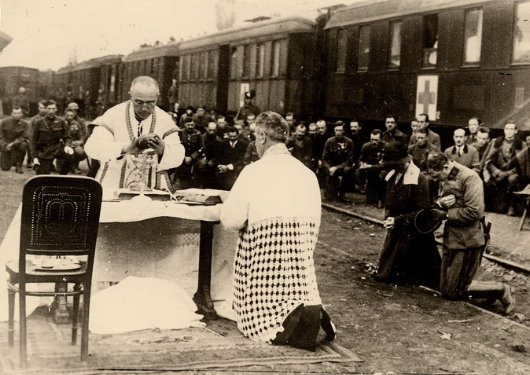
An Imperial Birthday
Gerald Warner has a splendid post over on his Daily Telegraph blog on Crown Prince Otto’s ninety-sixth birthday. Heavens! how time flies. It seemed like only yesterday was his ninety-fifth.
My favorite scene that Gerald mentions is this one:
Bravo, Budapest. And Hoch Habsburg!
Diary
Nothing ever happens in New York, or at least nothing when compared to Edinburgh, London, or Paris; this is my perpetual complaint. But when it rains, it pours, and so it was last night. Not only was it press day, the busiest day of the month-long cycle of creating each issue of The New Criterion, but then the evening beheld both “A Festive Evening Celebrating the Mission of the von Hildebrand Project” at the University Club and “The Reception and Dinner to Present the Medal for Heraldic Achievement” at the Racquet & Tennis Club. The simultaneous events were organized by the Dietrich von Hildebrand Legacy Project and the Committee on Heraldry of the New York Genealogical & Biographical Society, respectively.
A rarely-assembled fun crowd was promised at the von Hildebrand event, but nor was the presentation of the G&B’s medal a common occurrence (there have been only three awarded to date) so I simply resolved that I would do my best to attend both. (more…)
Russia Turns a Cinematic Page in History
Big-budget film celebrating anti-Communist hero & White Russian leader Admiral Kolchak is partly funded by Russian government
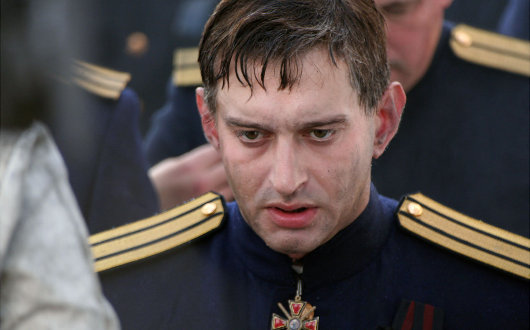
Here’s a film that has it all: naval battles, mutiny, revolution, civil war, brave men, beautiful women, sin, sacrifice, and betrayal on multiple levels. But “Admiral” («Адмиралъ»), which opened in Russia this month, is notable for another reason: this is the first major film depicting the tsarist White Russians as the good guys to receive at least part of its funding from the Russian government. The eponymous hero of the film is Alexander Kolchak, the naval commander and polar explorer who later led part of the White Army fighting the Bolsheviks during the Russian Civil War.
The Coronation of Blessed Charles
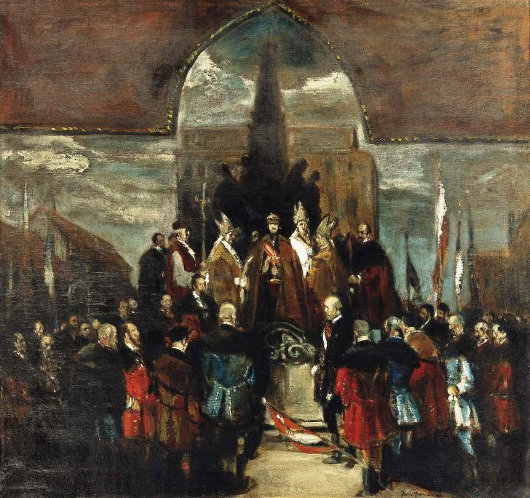
Blessed Emperor Charles was crowned as Apostolic King of Hungary on the 30th of December in 1916. It was the last Hapsburg coronation to this day. For those interested there are two accounts which do justice to the sacred rites. One is by that most devoted admirer of the Hapsburgs, Gordon Brook-Shepherd, in his excellent biography of Charles, The Last Hapsburg. (Brook-Shepherd also wrote excellent and quite readable biographies of the Empress Zita, of Crown Prince Otto, of Chancellor Dollfuß, and Baron Sir Rudolf von Slatin Pasha).
Charles & Zita
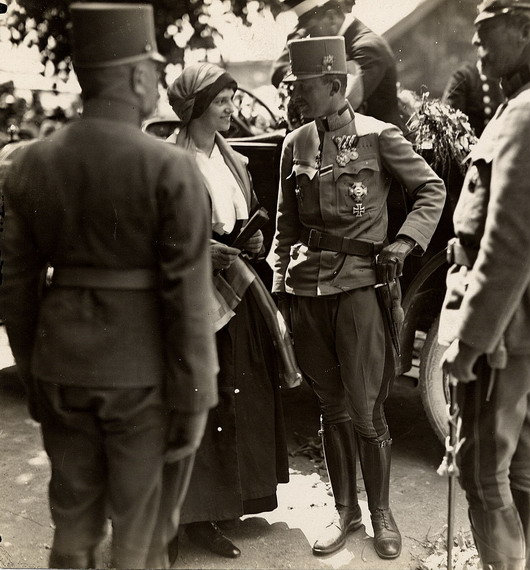
October 21 was chosen as the Feast of the Blessed Emperor Charles not because it is the date of his death — which is 1 April 1922 — but rather to commemorate the marriage (photo, below) between Archduke Charles of Austria (as he was then) and Princess Zita of Bourbon-Parma in 1911. While Charles died a mere thirty-four years of age, Zita lived on to ninety-six before passing away in 1989 (when I myself was four).
Not very long ago I was in Quebec City, which was where the Empress Zita and the Imperial Family spent their exile during the Second World War. The Hapsburgs, dispossessed first by the Socialists and then by the Nazis, were then so poor they had to collect dandelions from which to make a soup, but they took poverty in their stride. Passing a grassy bit near the Chateau Frontenac, I wondered “Did Crown Prince Otto once pluck weeds from this plot to feed his hungry mother and siblings?”
Also in that ancient Canadian city is La Citadelle, that great hunk of stone and earthworks, perhaps the oldest operational military installation in the New World. There we were lucky enough to be granted access to the tomb of the greatest Canadian, Major General the Rt. Hon. Georges-Philéas Vanier, Governor-General of Canada from 1959 until his death in 1967. General Vanier and his wife had such a reputation for Christian charity and piety that the Vatican is collecting evidence towards their eventual recognition as saints. Their son is Jean Vanier, the founder of the famous l’Arche communities that care for the handicapped and the disabled. I wonder if the Hapsburgs and the Vaniers ever crossed paths in wartime Quebec…
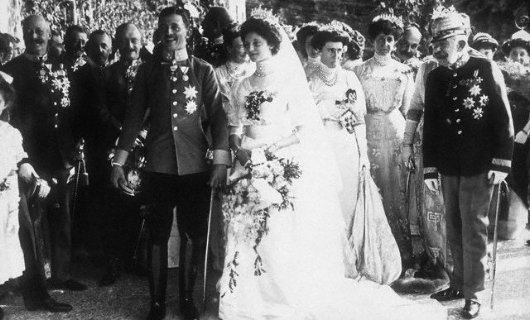
pray for us!
Let Louis XVI Rest in Peace; A Funeral Mass in Manhattan
By PETER STEINFELS | The New York Times | July 17, 1989
They came not to praise the French Revolution but to bury it.
In the place of tricolor bunting, there were the black vestments of an old-fashioned Roman Catholic funeral Mass. Instead of fireworks, there were the flickering candles of a Manhattan church. Instead of the “Marseillaise,” there was the rise and fall of Gregorian chant.
They came not to praise the French Revolution but to bury it. In the place of tricolor bunting, there were the black vestments of an old-fashioned Roman Catholic funeral Mass. Instead of fireworks, there were the flickering candles of a Manhattan church. Instead of the “Marseillaise,” there was the rise and fall of Gregorian chant.
Prinsjesdag
The State Opening of the States-General of the Netherlands
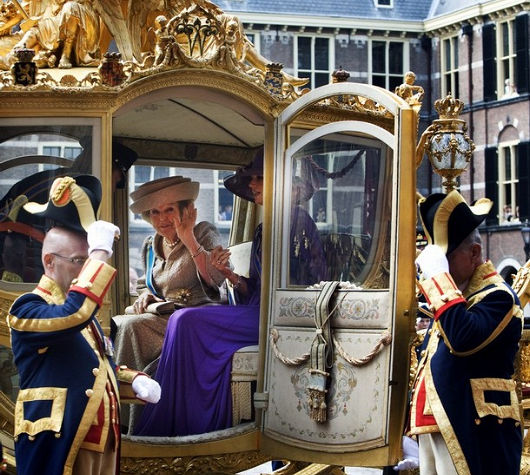
The third Tuesday in September beholds Prinsjesdag — the Day of the Princes — when the Queen of the Netherlands formally opens the annual parliamentary session of the States-General. Queen Beatrix arrives at the Ridderzaal (Knight’s Hall) of the Binnehof palace in the center of The Hague by means of the Gouden Koets (Golden Coach) presented to her predecessor Wilhelmina by the grateful burgers of the city of Amsterdam.
Search
Instagram: @andcusack
Click here for my Instagram photos.Most Recent Posts
- Bicycle Rack April 29, 2024
- Burns Tower April 19, 2024
- Patrick in Parliament March 18, 2024
- Articles of Note: 13 March 2024 March 13, 2024
- Cambridge March 9, 2024
Most Recent Comments
Book Wishlist
Monthly Archives
Categories

